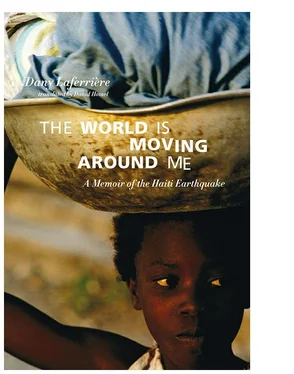A brief dialogue between him and a journalist (imaginary, but based on information gathered from various sources):
Q: When will it happen?
A: The earthquake could occur at any time.
Q: Could you be more precise?
A: Now, or in ten years.
Q: Now?
A: Yes. Even as we are speaking.
Q: And what are the possible risks?
A: Difficult to evaluate, but everything indicates enormous proportions.
Q: Thousands of deaths?
A: Possibly, perhaps more.
His academic tone made people nervous. They were fascinated by this man, who calmly announced the coming apocalypse. In the street, they stopped to question him. Why didn’t he leave if he was so sure what was going to happen? He wasn’t the kind of man who would abandon his city. I recognized my friend from avenue Bouzon. The son of a military man. You don’t leave a sinking ship. I looked up and greeted him. We smiled. He had wanted to see me again. Silence between us. How was it for you? He told me he was in the yard when it happened. He knew it was at least a magnitude seven. Here was the event he’d been predicting for ten years. What did you think at the time? “Honestly, it was a relief. It was the proof that I wasn’t crazy.” I saw a lost look in his eyes. He’d done everything to warn the population, but no one had listened. Instead, they mocked him. Now that it’s too late, everyone is consulting him. The people in line started getting impatient. He shook my hand, gave me a sad smile that reminded me of my mother, then disappeared into the crowd.
Secret Ceremony
Now that foreigners are finding their way to Haiti, they’ll be sure to fall under the spell of voodoo again. Volunteers (all those former religious types who have recycled themselves into humanitarian workers) and intellectuals are going to simmer in the old colonial kettle. Instead of wasting precious time chasing after fake voodoo ceremonies, they would be better off trying to understand the nation by seriously studying its vision of the world. The first man who says, “I attended a secret ceremony” should be laughed out of the country. If it really was secret, you wouldn’t be accepted. Why was your presence tolerated at a secret ceremony? For money? You’re quick to answer the question: “No, I didn’t pay.” Which had you concluding it was a real ceremony. In any case, either you paid in advance without realizing it (the ceremony organized for your benefit was a reward for your past good deeds), or you’ll pay later. One way or another. There are so many rules you can’t know in this universe heavy with false mysteries. If you’re there, the ceremony isn’t secret. Remember the old saying: if someone else knows, it’s not a secret.
Ancient Knowledge
These people who bear their pain with extraordinary grace have such a sense of life, and it would be a shame to ignore it. Seeing their serenity, you can imagine how much they know about pain, hunger, and death, and how much violent joy lives inside them. Joy and pain are transformed in singing and in dance. What can we do with such knowledge? We sometimes see it shining through in the colorful canvases of the naïve painters or in that irresistible music that loses itself in its own explosive joy. If we listen more carefully, we might be surprised to discover that the words that got us up on the dance floor are achingly sad. That’s where the secret of this country resides. And not in the ready-made voodoo served up to tourists and Haitians who have been out of the country too long.
The Energy of Money
We know about the energy that money brings. It’s an aggressive force that happily sweeps aside everything in its path. The man who helps you sometimes grants himself the privilege of judging you. The least you can do is listen to him. The argument runs like this: your knowledge has failed. Don’t bother protesting, because that’s the truth. He’s helping you, and not the other way around. He’ll shove his culture in your face with a tone of false humility, which is the worst vanity of all, along with the arrogance that comes from believing that the other guy hasn’t understood the situation — and that he’s swallowed your line whole. Those who have come to help should receive a crash course in popular culture: if someone listens to you without interrupting, it’s not because you’re interesting, it’s because the other guy is waiting for you to finish so he can get down to serious business: money. Do you have any? And how much? In small bills, if possible. I’ve heard the directors of big companies and humanitarian organizations state in no uncertain terms for the camera that they’re here to help people, and have no ulterior motives. That’s possible. But why do they get angry when the other guy forgets to kneel down and thank them? The problem is that, over time, Third-World populations have developed a welfare mentality. They know the workings of the international aid system — we can sense that. They have studied it carefully. Some of them have nothing else to do. They know that the amounts distributed by private individuals are reimbursed by the tax departments and ministries of revenue in their home countries. The money has its source in the workings of accountants. Then you have to factor in the aura of belonging to a group of people with a social conscience. The information circulating among the poor has given them the impression that they are partners, not dependents. Which saddens those people whose job it is to help, and who are only asking for a little recognition in return. But the clever folks in the Fourth World have quickly understood that recognition has an exchange value and shouldn’t be tossed out the window. On the Judeo-Christian exchange, charity is still in the top ten. It’s a vicious game and neophytes are quickly devoured. People would be better off following the example of those smiling sisters who have been working in the Haitian countryside for decades. Those women would make short work of a hoary old Marxist or even a retired Mafioso. The nuns are real pros, and they have accumulated the kind of knowledge that should be put to work if we want charitable gifts to lead to real action.
The Beggar’s Alms
A woman took my arm and smiled.
“As soon as I saw those pictures on TV, I thought of you.”
>She looked me straight in the eye. A small woman, thin, in her sixties.
“Can I give you a hug?”
She put her arms around me.
“I’ve prayed a lot for Haiti. And I’m still praying. What a disaster! If there’s one country that doesn’t need misfortune, it’s that one.”
She held my hand. Her eyes were on mine. I felt her gentleness.
“I’m not going to claim I sent money to Haiti. I don’t have enough for that. But I’ve prayed a lot for the Haitian people. Proud, clean people who don’t deserve such a fate … I wonder how they get along.”
“They do everything possible to live as long as possible.”
“I understand … I have nothing to give, like I told you. Except my heart.”
“That’s a lot, madame. Your gift will be delivered. I’ll see to it myself.”
She took me in her arms again.
Calvary Mountain
Our cook lives on Calvary Mountain. To return home after work, she has to walk a good twenty minutes to get out of Delmas 31 where our house is, then she waits for a tap-tap on the highway that will take her to Pétionville, in front of place Saint-Pierre, and from the square, she walks the rest of the way. On rainy days, like today, my sister drives her home. Instead of staying inside and watching the rain fall, I go with them. The city is under water. The wind is at gale force. The vendors we drive by are soaked to the skin. They climb the slope, their eyes closed against the pelting rain that punishes their faces. We reach Calvary Mountain. This is the first time that I’ve come up here. I get a sick feeling every time I come close to the cliff. I’ve always associated this region with the ladies who sell us those fat onions and juicy carrots that smell of the rich earth. In fact, this is the richest zone in Haiti — unless there’s one richer that I don’t know about. I’ve never seen so many magnificent villas. Giant pine trees surround them or stand on either side of the entryways like faithful sentinels. A feeling of peacefulness holds sway here; it makes you want to die. You have to keep reminding yourself that you’re not on the shores of Lake Geneva. I’m not envious, actually, and I don’t care about other people’s wealth. I haven’t internalized the class struggle, but here I’m really astounded. And to think my cook lives next to such abundance. Every day she walks through this district and goes down to work in the heart of Delmas. And never a complaint. She thinks that’s as normal as the rain pelting the roof of the car. Most of these houses are empty. Their owners spend part of the year in Italy and part in England or somewhere else. I’m not criticizing their lifestyle (I travel a lot myself), but the fruit rotting on the ground and the empty rooms are a shame in a city where the majority of the population lives in precarious conditions. On the way back down, we go past the camp on place Saint-Pierre. When you think that the people who live here get hit with a downpour almost every evening and that the wind sometimes blows away their tents. And that every morning luxury automobiles from Calvary Mountain (a calvary for whom?) rush past them, driving children to school. I wonder if those children ever ask their parents about how the other children (it’s the same word for both groups) live, the ones they see emerging, fully dressed, from that anthill. Maybe no one sees what’s so obvious. But I’m sure that kids pick up on the situation right away. It’s not surprising that some leave home as soon as they can. Some kinds of pain can’t be silenced with drugs.
Читать дальше












